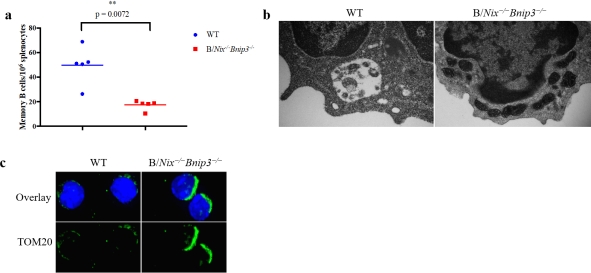Mitochondrial Autophagy Proteins Bnip3 and Nix Maintain Memory B Cell Survival
1Immunobiology and Transplant Science Center, Houston Methodist Research Institute, Houston, TX
2Department of Pathology and Immunology, Baylor College of Medicine, Houston, TX.
Meeting: 2018 American Transplant Congress
Abstract number: 181
Keywords: Antibodies, knockout, Lymphocytes, Mice
Session Information
Session Name: Concurrent Session: B-cell / Antibody
Session Type: Concurrent Session
Date: Monday, June 4, 2018
Session Time: 2:30pm-4:00pm
 Presentation Time: 3:30pm-3:42pm
Presentation Time: 3:30pm-3:42pm
Location: Room 615/616/617
Despite the use of immunosuppressive drugs, allograft rejection remains a major hurdle for the long-term success of organ transplants. Burgeoning evidence implicates memory B cells (MBCs) in allograft rejection. MBCs are long-lived, quiescent lymphocytes that form during an initial antigen encounter, and persist to mount a more rapid, potent response to rechallenge with the same antigen. MBCs form the basis of the long-term protective immunity induced by vaccination, but can mediate allograft rejection in the context of transplantation. In order to target MBCs responsible for transplant rejection, it is important to understand the mechanisms of MBC survival.
Autophagy, a process for lysosomal degradation of cytoplasmic cargo, has been shown to be vital for MBC survival. We hypothesize that autophagy maintains MBC survival by regulating mitochondrial homeostasis.
The Bcl-2 family proteins Bnip3 and Nix mediate mitophagy, the selective clearance of mitochondria by autophagy. To study the role of mitophagy in MBC survival, we generated mice with B cell-specific deletion of Bnip3 and Nix (B/Nix−/−Bnip3−/−). We immunized WT and B/Nix−/−Bnip3−/− mice with the model antigen NP-KLH to induce MBC formation. By ELISA and flow cytometry, we find that B/Nix−/−Bnip3−/− mice have normal primary antibody responses and form MBCs normally. However, B/Nix−/−Bnip3−/− mice lose MBCs over time (Fig. 1a). Microscopy shows that Nix−/−Bnip3−/− MBCs have impaired mitophagy and increased mitochondrial mass (Fig. 1b-c). Moreover, transcriptional and extracellular flux analyses indicate that Nix−/−Bnip3−/− MBCs have altered mitochondrial metabolism, which may inhibit their survival.
Overall, our results reveal a key role for mitophagy in MBC maintenance. Mitophagy may thus present a therapeutic target to attenuate MBC-mediated allograft rejection.
Figure 1. (a) Frequency of MBCs in WT and B/Nix−/−Bnip3−/− mice (6 weeks post-immunization). (b) Transmission electron and (c) deconvolution microscopy of WT and Nix−/−Bnip3−/− memory B cells. Blue: nuclei, green: mitochondria.
CITATION INFORMATION: Kodali S., Sandoval H., Chen M., Wang J. Mitochondrial Autophagy Proteins Bnip3 and Nix Maintain Memory B Cell Survival Am J Transplant. 2017;17 (suppl 3).
To cite this abstract in AMA style:
Kodali S, Sandoval H, Chen M, Wang J. Mitochondrial Autophagy Proteins Bnip3 and Nix Maintain Memory B Cell Survival [abstract]. https://atcmeetingabstracts.com/abstract/mitochondrial-autophagy-proteins-bnip3-and-nix-maintain-memory-b-cell-survival/. Accessed February 19, 2026.« Back to 2018 American Transplant Congress

